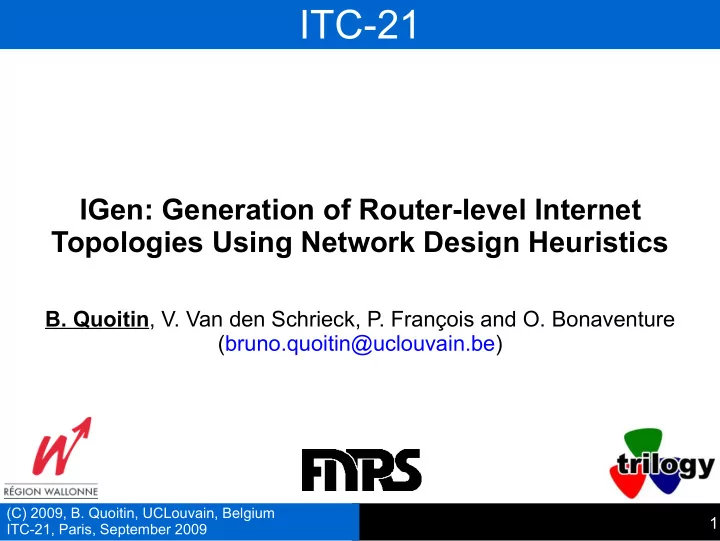

ITC-21 IGen: Generation of Router-level Internet Topologies Using Network Design Heuristics B. Quoitin , V. Van den Schrieck, P. François and O. Bonaventure (bruno.quoitin@uclouvain.be) 1 (C) 2009, B. Quoitin, UCLouvain, Belgium 1 ITC-21, Paris, September 2009
Motivations ● Routing Sensitivity Analysis ● Study sensitivity of (BGP) routing to several “topological” parameters Relate Sensitivity of Metrics to Parameters ??? Network Routing Design Efficiency Parameters Metrics Routing Measure Topology Selected Topology Solver Routing Generator Paths (C-BGP) Efficiency http://inl.info.ucl.ac.be/softwares/c-bgp 2 (C) 2009, B. Quoitin, UCLouvain, Belgium 2 ITC-21, Paris, September 2009
Generating Topologies... ● Issue 1 ● “[...] a careful design process [...] can yield high performance topologies, but these are extremely rare from a probabilistic graph point of view.” [Lun Li et al, ACM SIGCOMM'04] Subset of “Designed” Topologies Set of all Performance Possible Topologies Probabilistic models Likelihood sample this set 3 (C) 2009, B. Quoitin, UCLouvain, Belgium 3 ITC-21, Paris, September 2009
Generating Topologies... ● Issue 2 ● Well-known topology generator: Waxman − d u ,v . L P u ,v = .e ● How to set , to achieve realistic network design objectives ? – minimize delay – maximize bandwidth – ensure robustness – limit financial cost – match equipment / technology constraints – ... 4 (C) 2009, B. Quoitin, UCLouvain, Belgium 4 ITC-21, Paris, September 2009
Methodology (1) Input: Generate Assign Set of nodes Build iBGP Group into backbone capacities topology PoPs and PoPs and weights ● Import existing set of nodes ● with coordinates (e.g. from existing network or geoloc DB) ● Generate set of nodes ● (X,Y): X~Uniform, Y~Uniform ● optional constraints: (x,y) falls into set of polygons 5 (C) 2009, B. Quoitin, UCLouvain, Belgium 5 ITC-21, Paris, September 2009
Methodology (2) Input: Generate Assign Set of nodes Build iBGP Group into backbone capacities topology PoPs and PoPs and weights ● Clustering methods ● based on distance (euclidian or geodesic) ● k-medoid (targets k PoPs) or hierarchical (target k PoPs but bounds intra-PoP variance) 6 (C) 2009, B. Quoitin, UCLouvain, Belgium 6 ITC-21, Paris, September 2009
Methodology (3) Input: Generate Assign Set of nodes Build iBGP Group into backbone capacities topology PoPs and PoPs and weights ● Mesh synthesis methods ● trees, union of disjoint trees, rings, union of rings, triangulation ● loose control on graph density and connectedness ● specific layout for PoPs (e.g. Sprint-like) 7 (C) 2009, B. Quoitin, UCLouvain, Belgium 7 ITC-21, Paris, September 2009
Backbone Generation Methods There are Hybrid MST / SPT 2 links here :-) Hybrid MST / SPT MENTOR (0.7) MENTOR (0.3) MST Union of 2 disjoint trees (MSTs in example) Delaunay Union of 3 rings triangulation Minimum cost Union of 2 rings cycle 8 (C) 2009, B. Quoitin, UCLouvain, Belgium 8 ITC-21, Paris, September 2009
PoP Layout (Sprint-like) 1 st param: number of backbone routers in PoP (default: 2) 2 nd param: number of links from access routers to backbone routers 9 (C) 2009, B. Quoitin, UCLouvain, Belgium 9 ITC-21, Paris, September 2009
Methodology (4) Input: Generate Assign Set of nodes Build iBGP Group into backbone capacities topology PoPs and PoPs and weights ● Capacities ● Based on traffic matrix (computes APSP and forward) ● 2-levels. Example core=1GB / access=155MB ● IGP weights ● Based on distance / inverse of capacity 10 (C) 2009, B. Quoitin, UCLouvain, Belgium 10 ITC-21, Paris, September 2009
Methodology (5) Input: Generate Assign Set of nodes Build iBGP Group into backbone capacities topology PoPs and PoPs and weights ● iBGP topology ● full-mesh ● iBGP hierarchy (2 levels), route-reflectors chosen among backbone routers, access routers are clients of route- reflectors in their PoP 11 (C) 2009, B. Quoitin, UCLouvain, Belgium 11 ITC-21, Paris, September 2009
Example (1) http://inl.info.ucl.ac.be/softwares/igen Generate 50 vertices Constrain /w polygon 12 (C) 2009, B. Quoitin, UCLouvain, Belgium 12 ITC-21, Paris, September 2009
Example (2) 1). Build 5 clusters based on distance k-medoids:5 2). Build PoPs using “Sprint” layout sprint:2:2 3). Build backbone using triangulation delaunay 4). Assign IGP weights distance:0 based on link mileage access-backbo 5). Assign 155M/1G to access/backbone links resp. 13 (C) 2009, B. Quoitin, UCLouvain, Belgium 13 ITC-21, Paris, September 2009
Example (3) One of the 5 PoPs (clusters) 14 (C) 2009, B. Quoitin, UCLouvain, Belgium 14 ITC-21, Paris, September 2009
Conclusion Our method generates Set of all a few elements. How to Possible better sample subset ? Topologies Subset of “Designed” Topologies ● Further work ● Finer control on graph density ● More than 2-tiers ● Other typical PoP designs ● Other node placement strategies ● Synthesis of Internet-wide topologies (in progress) 15 (C) 2009, B. Quoitin, UCLouvain, Belgium 15 ITC-21, Paris, September 2009
Questions ??? 16 (C) 2009, B. Quoitin, UCLouvain, Belgium 16 ITC-21, Paris, September 2009
Recommend
More recommend